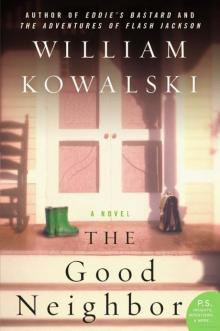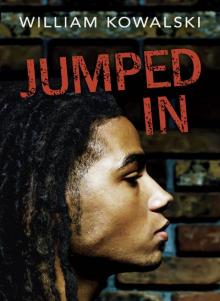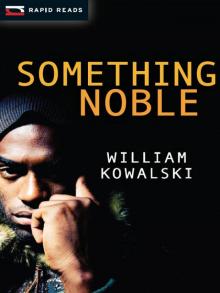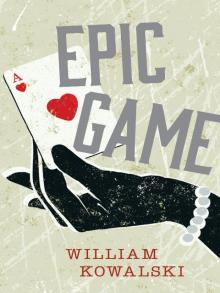- Home
- William Kowalski
Just Gone
Just Gone Read online
JUST
GONE
ALSO BY WILLIAM KOWALSKI:
Orca/Raven
The Barrio Kings (2010)
The Way It Works (2010)
Something Noble (2012)
HarperCollins
Eddie’s Bastard (1999)
Somewhere South of Here (2001)
The Adventures of Flash Jackson (2003)
The Good Neighbor (2004)
Thomas Allen Publishers
The Hundred Hearts (2013)
JUST
GONE
WILLIAM KOWALSKI
Copyright © 2013 William Kowalski
All rights reserved. No part of this publication may be reproduced
or transmitted in any form or by any means, electronic or mechanical,
including photocopying, recording or by any information storage
and retrieval system now known or to be invented, without permission
in writing from the publisher.
Library and Archives Canada Cataloguing in Publication
Kowalski, William, 1970-
Just gone [electronic resource] / William Kowalski.
(Rapid Reads)
Electronic monograph.
Issued also in print format.
ISBN 978-1-4598-0328-2 (PDF).--ISBN 978-1-4598-0329-9 (EPUB)
I. Title. II. Series: Rapid reads (Online)
PS8571.0985J87 2013 C813’.54 C2013-901877-8
First published in the United States, 2013
Library of Congress Control Number: 2013935303
Summary: Angelique’s work at a homeless shelter takes a turn when
she meets seven-year-old Jamal and a mysterious character named
Jacky Wacky. (RL 3.0)
Orca Book Publishers gratefully acknowledges the support for
its publishing programs provided by the following agencies:
the Government of Canada through the Canada Book Fund and the
Canada Council for the Arts, and the Province of British Columbia
through the BC Arts Council and the Book Publishing Tax Credit.
Design by Teresa Bubela
Cover photography by Getty Images
ORCA BOOK PUBLISHERS ORCA BOOK PUBLISHERS
PO BOX 5626, Stn. B PO BOX 468
Victoria, BC Canada Custer, WA USA
V8R 6S4 98240-0468
www.orcabook.com
16 15 14 13 • 4 3 2 1
To Lidia, con gratitud.
Contents
CHAPTER ONE
CHAPTER TWO
CHAPTER THREE
CHAPTER FOUR
CHAPTER FIVE
CHAPTER SIX
CHAPTER SEVEN
CHAPTER EIGHT
CHAPTER NINE
CHAPTER TEN
CHAPTER ELEVEN
CHAPTER TWELVE
CHAPTER THIRTEEN
CHAPTER FOURTEEN
CHAPTER ONE
I used to work at this shelter downtown. It was a place for women and children who were having a rough time. We didn’t allow men inside.
Don’t get me wrong. I got nothing against men in general. It’s just that in my line of work, I didn’t meet too many good ones. The good men mostly stayed away from our place. They had business elsewhere, I guess.
I used to hope I would meet a good man. In fact, I longed for it. But not for the reasons a woman normally does. I didn’t need any doings with men. It might be fun and games for a while, but when a woman spends enough time with a man, she ends up with a child. There were already enough children in the world who had no one to take care of them and nowhere to go. And there were enough women who got left high and dry. I did not want to be one of those.
So I gave up my life to help women and their kids instead. Mostly the kids. I decided a long time ago it was my mission in life to pick up where other people left off. That was my real purpose—to take care of the little ones who could not take care of themselves.
Saturday nights at the shelter were always crazy. I worked the door. When you work the door, you have to be on your toes. You never know who’s gonna come walking in, or who’s gonna be following them.
Sometimes a lady might show up with a black eye and a crying baby. A few minutes later the man who gave her both might walk in, demanding to see her.
I do not believe in violence. But I kept a cosh under the counter, just in case someone showed up who did. This cosh was a piece of plastic pipe about a foot and a half long. It was filled with BBs and sealed at both ends. I had the janitor of my building make it for me on the sly. Sometimes I had to use it to persuade people to see things my way. For a small woman, I could swing that thing pretty good.
One Saturday night a long time ago, a teenage girl and a little boy came in. You couldn’t tell at first if they were brother and sister or mother and son.
I remember the boy for two reasons. One is that he was covered in rat bites. They were fresh too. You tend to remember that kind of thing.
The other reason I remember that boy is because he was one of the most beautiful children I’d ever seen. All kids are beautiful to me. But this little one just seemed to glow. It was like he had some kind of special light in him.
I took one look at his bites and decided I was not going to bother with the paperwork.
“Uh-uh. No way. You got to get him to a hospital,” I told the girl.
She was maybe fourteen, he was maybe seven. They were both so thin, they looked like they’d just crawled out of some concentration camp. The little boy was wearing shorts and sneakers, nothing else. No shirt, no socks. There were bites on his stomach and his arms. There was another one on his right cheek that I could tell was going to scar up bad.
And he had other scars that were not rat bites. It looked to me like that boy had been hurt more than once in his short life by people who were big enough to know better. But if he was in pain, he gave no sign of it. Nothing was going to dim his light.
“We can’t go to no hospital,” the girl told me. She mumbled so bad I could hardly hear her. “They gonna split us up.”
“What do you mean?” I asked her.
“They already tried once to take him away. They ain’t takin’ him again.”
“Who is this boy to you?”
“He my brother,” the girl said.
“Where’s your mama at?”
“Gone.”
“Gone where?”
“Just gone,” said the girl.
Some folks at the shelter did things by the book. When we got a new intake, I was supposed to get her name and address, if she had one, plus some other information. But this time I just did what needed to be done. I took them back into the bathroom and I sat the little boy on the sink. I got down the first-aid kit and took out the disinfectant. He didn’t make a peep when I started washing his bites. His sister stood there and watched.
“These bites are dirty,” I told her. “He might have rabies.”
“What’s that?”
“Girl,” I said, “are you serious? Rabies is a disease. Rats got it. And they can give it to people. You want your brother to get sick? He needs a shot. He needs to be seen by a doctor.”
“Jacky Wacky ain’t gonna let me get no rabies,” said the little boy.
“You shut up about that,” said his sister.
“Jacky who?” I said.
“Jacky Wacky,” said the boy. “The magic man who looks out for us kids.”
“He always talkin’ ’bout Jacky Wacky,” said the girl. “He crazy.”
“I ain’t crazy. You crazy for not believing in him,” said the boy.
“Now you just stop it,” I said. “We don’t allow bad talk here. Only nice talk. What all are your names?”
“Chantay,” said the gir
l.
“Jamal,” said the boy.
“Well, Chantay and Jamal, you can call me Mother Angelique. You two come on out here. I’m gonna give this boy a shirt out of the donation box, and I’m gonna get you something to eat. You hungry?”
They looked at each other all big-eyed. I don’t know why I even bothered asking. They were always starving when they came through that door. Every single one of them.
“Come on,” I said.
I found a T-shirt that fit the boy. It had the number eleven on it. Then I went back in the kitchen and got two meals out of the fridge. These were nothing more than baloney sandwiches, a bag of chips and a juice box on a Styrofoam plate. Chantay and Jamal looked at me like I’d just delivered a four-course meal. They sat at one of the tables and ate everything in about two seconds. Meanwhile, I had left the front door unattended, which I was not supposed to do, so I went back and sat there in case anyone came in.
I had every intention of calling the paramedics to have them come look at that boy, but I got distracted when someone else showed up. It was a woman in tears. She was followed a few minutes later by her boyfriend. He was all hopped up on something and feeling mean. Things got crazy for a while. I had to dial those three magic numbers, 9-1-1. After the cops came and took him away, I remembered Chantay and Jamal. I looked for them, but they were gone. They must have slipped out in all the confusion.
There was nothing I could do about it. So I said a little prayer for them, like I do for all the little ones who are lost in this world, and then I forgot about them.
Don’t think less of me for it. It wasn’t because I didn’t care. It was just that there were so many kids like them out there. I can only do so much. The rest of it I gotta give up to the higher power. Nothing else I can do.
CHAPTER TWO
I wouldn’t be telling this story if I didn’t see those two again. But I might be telling some other story about the wayward souls who came through that door. I got plenty of stories. For almost forty years that shelter was my life. I heard more stories than I wanted to hear, and I saw more things than I wanted to see.
I’m retired now. Retirement means I only work five days a week instead of seven. I got to slow down. My bones are getting creaky. A lot of time has passed. But sometimes I still think about Chantay and Jamal. Especially when I hear his name mentioned in the stories of the shelter children. Even now, years later, they still talk about him.
After that first night, I didn’t think I was going to see them again. But they were back the very next day. This time, I made them sit down and tell me everything they could about themselves. They didn’t want to give up anything. At first I thought they were being cagey with me. But soon enough I realized they just didn’t know very much about who they were.
“What’s your last name?” I asked them.
We were sitting at one of the rickety old shelter tables. Jamal just shrugged his shoulders. Chantay looked embarrassed.
“Well, come on,” I said. “It’s not rocket science, is it? Don’t worry, I’m not gonna tell on you. You haven’t done anything wrong, have you? It’s no crime to be poor. What’s your family name?”
“Our mama was always changing her name,” said Chantay. “I don’t remember which one was the real one. Besides, me and Jamal, we got different daddies.”
“All right,” I said. “We’ll just put Doe. I guess you probably don’t know your social number, huh?”
“Seven!” said Jamal.
“No, that’s how old you are,” I said. “Listen, forget about all this government stuff. Can you tell me what happened to your mama?”
“I done told you, lady,” said Jamal. “Jacky Wacky got her.”
“Don’t you get mouthy, young man,” I told him. “We speak with respect around here. Got it?”
“Yes, ma’am,” he said.
“Our mama dead,” said Chantay. “That’s what he means.”
“Oh, dear, I am sorry,” I said. “How did that happen?”
“Bullet came through the window,” said Chantay. She had to say it about four times before I could hear her. She had a habit of talking to her shoes.
I got it out of her little by little. It was a sad story, but not an unusual one. They lived in the worst part of town. Or did until one day when there was a shootout in the street outside their apartment. Gangbangers trying to do each other in. Turned out the poor woman was just watching television when she got hit by a stray shot. The kids came out into the living room in the morning and found her dead on the couch.
“When was this?” I asked.
“I dunno,” said Chantay. “Maybe four, five days ago.”
“Isn’t there anybody who can take you in?” I asked. “No family? No friends?”
“They all just gone,” said Chantay.
“Well, what did the police say?” I asked them.
Once again those kids just looked at each other. Jamal edged closer to his big sister and put his arm around her waist.
“We didn’t call the police,” she said.
I didn’t need to ask why. The people I work with have a mortal fear of cops. They are just as afraid of them as they are of the gangbangers who still rule these streets. I have a lot of respect for the officers who do their best in this city. But, like in any other group, there are good ones and bad ones. And most of them don’t have a lot of patience for the people they keep seeing day after day. People who are killing each other, fighting over a few square feet of concrete, pumping their bodies full of drugs, doing nothing to improve their lives.
I can understand their frustration. Me and the cops, we both want to make things better in this city. I just go about fixing things in a different way.
“So where did you go after they took your mama away, God rest her soul?” I asked.
“We went into one of the board-ups,” said Chantay. “We been living there. That’s where the rats got Jamal.”
“They didn’t take mama away,” Jamal piped up.
“What do you mean?” I asked him. “Didn’t you call anybody?”
“We don’t have no phone,” said Chantay. “We just left.”
A chill came over me as I realized what she was saying.
“Good Lord, girl,” I said. “You don’t mean to tell me your mama is still there?”
Chantay began to cry.
“I tried and tried to wake her up,” she said. “But she wouldn’t answer me. I didn’t know what else to do. I took Jamal and covered up his eyes so he didn’t have to look at her. And we just left.”
“Oh, merciful Father,” I said into my hands.
There are some days when living in this city is no different than living in a war zone. When you got children wandering the streets for days with their mama dead in their apartment, you might think there was a war going on right here. And there is. You watch the news, you see pictures of far-off countries where folks live in dirt and have no food to eat. The streets are in ruins. No one is safe.
Well, let me tell you something. I don’t need to watch the news to see that kind of thing. It happens right here at home. Other folks call it a tragedy. I call it reality. And it’s the children who are the victims.
CHAPTER THREE
I had one or two friends on the police force. I called on them whenever I needed someone I could really trust. So after I got Chantay to tell me where they lived, I made a call to Sergeant Kosinski. He and I went way back. We helped each other out when we could. I told him what those kids told me. And I told him what he would find when he went to their apartment. I asked him to call me back after he checked into it.
When I hung up the phone, I turned to see Chantay and Jamal heading out the door.
“Now just wait a minute,” I said. “Where do you think you’re going?”
They stopped. I was glad, because I wasn’t up to chasing them down the street. I didn’t know it yet, but the sickness that was going to take over my life was already inside me. I was tired all the time. I thought it w
as just because I worked too hard, saw too much bad stuff. Maybe that’s what made me sick in the first place. Or maybe it was just always meant to be. You gotta die of something, after all.
“You two come back here,” I said. “You can’t go out there on your own. You were going back to that board-up, weren’t you?”
They nodded.
“And back to the rats,” I said. “And the crackheads and the gangbangers and the bullets flying around the place. Listen, children, you stay here tonight. Let me look after you.”
They were still edging toward the door. I don’t know what they were so afraid of. Being split up, I guess. Ending up in a foster home. Or maybe jail. You don’t need to commit a crime to go to the slammer around here. All you got to do is be poor.
“I’ll give you some more to eat,” I said. “You can sleep here too. We’ve got plenty of beds. It’s safe here. I promise.”
Food was the magic word. They turned around and came back in. I gave them a couple more sandwiches.
There were about four or five women in the shelter that night, and they had their kids with them. Jamal went back to play with them. He acted like he didn’t have a care in the world. Chantay, she just sat down at one of the tables and looked at her shoes, like they were the most interesting things in the world.
“Don’t you want to play?” I asked her.
“Play what?” she said. “Life ain’t no game.”
It wasn’t an hour until the phone rang.
“Yeah, Mother, we found her,” Sergeant Kosinski said. “Just like you said. Mind me asking how you knew about this?”
“A couple of little birds told me,” I said.
“You know anything about this murder, you oughta tell me,” said Sergeant Kosinski.
“I’m not hiding anything from you, Sergeant,” I told him. “I just got a tip, that’s all. She’s got two kids who are scared stiff of what might happen to them.”
“We’re gonna have to call social services,” said the sergeant.
I shuddered. I knew what that meant. They’d be sent to a place that was more like a prison than a home. They’d be fed and clothed, but not much else. I could do that much here. And they would be a lot safer with me.

 The Good Neighbor
The Good Neighbor Eddie's Bastard
Eddie's Bastard Jumped In
Jumped In Something Noble
Something Noble The Adventures of Flash Jackson
The Adventures of Flash Jackson Just Gone
Just Gone The Way It Works
The Way It Works Epic Game
Epic Game